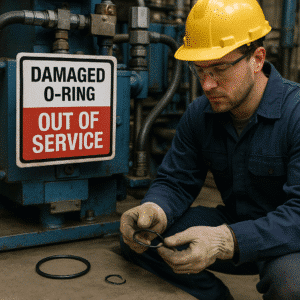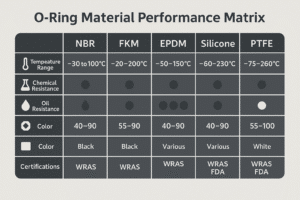Wondering which oil seals your car needs—or whether aftermarket ones will work just as well? From crankshafts to camshafts, oil seals are found in every corner of your vehicle.
Automotive oil seals prevent engine oil, transmission fluid, or grease from leaking while keeping contaminants out. Choosing the right one ensures performance, prevents wear, and extends service life.
In this guide, I’ll break down where oil seals are used in vehicles, the types you’ll find, and how to select compatible aftermarket alternatives.
What is an automotive oil seal?
An automotive oil seal is a flexible rubber component that fits between rotating shafts and stationary housings in a vehicle. Its job is to contain lubricants and exclude dust, dirt, and water.
Typical locations include crankshaft ends, camshafts, axle hubs, transmission shafts, and differentials. These seals must handle rotation, pressure, temperature, and sometimes corrosive fluids.
If you're dealing with crankshaft sealing issues, our detailed crankshaft oil seal guide breaks down symptoms and solutions.
Where are oil seals used in vehicles?
Automotive oil seals are used in every major fluid-containing system. Here’s a breakdown:
| система | Тип ущільнення | функція |
|---|---|---|
| Engine | Crankshaft, camshaft, valve stem | Retain motor oil under pressure |
| Transmission | Shaft seals, oil pan gasket seals | Prevent fluid leakage during gear shifts |
| Differential | Axle shaft seal, pinion seal | Hold gear oil and protect gear sets |
| Wheels | Hub and CV seals | Seal grease and reduce friction |
| Steering | Shaft seals in hydraulic systems | Prevent fluid loss and contamination |
When working with Japanese vehicles, it's common to encounter rear crankshaft leaks—we recommend checking out our Toyota-compatible oil seals for easy OEM replacement.
What types of oil seals are used in automotive systems?
There are several types of seals, each suited for specific locations:
| Тип | Структура | Загальне використання |
|---|---|---|
| TC | Подвійна губа з металевою оболонкою | Колінчасті вали, розподільні вали |
| TG4 | Rubber-coated double-lip | Dusty or vibrating areas (CV joints) |
| SC / VC | Single-lip | Low-pressure systems |
| Cassette Seals | Multi-lip + dust exclusion | Trucks, heavy vehicles |
| O-rings & gaskets | Static sealing | Valve covers, oil pans |
The TG4 seal is often preferred in high-dust or agricultural environments, while the TC type handles high-speed shaft sealing.
Can I replace automotive oil seals on my own?
Some automotive oil seals are DIY-friendly:
- Легко: Valve cover seals, cam seals
- Помірний: Crankshaft front seals, axle hub seals
- Difficult: Rear main seals, transmission shaft seals
наш installation guide walks you through proper seating techniques and tool recommendations to avoid lip damage or misalignment.
Are aftermarket oil seals reliable for vehicles?
Yes, quality aftermarket seals can perform just as well as OEM parts.
At Hengoseal, we manufacture oil seals that match OEM specs and are compatible with global models including Toyota, Honda, Nissan, VW, and more. Each seal is available in NBR or FKM, lab-tested for wear, and ready to ship globally—even in low MOQs.
наш skeleton oil seal guide can help you understand the structure behind most automotive shaft seals, so you select the right one for your vehicle or fleet.
Висновок
From engines to axles, oil seals are essential for vehicle performance and reliability. Understanding where they’re used and how to select them helps prevent leaks and costly repairs.
Whether you’re a repair shop sourcing crankshaft and camshaft seals or an importer needing flexible MOQ and custom packaging, Hengoseal delivers automotive oil seals you can trust—OEM fit, aftermarket price.
📧 Електронна пошта: [email protected]
📱 WhatsApp: +86 17622979498


